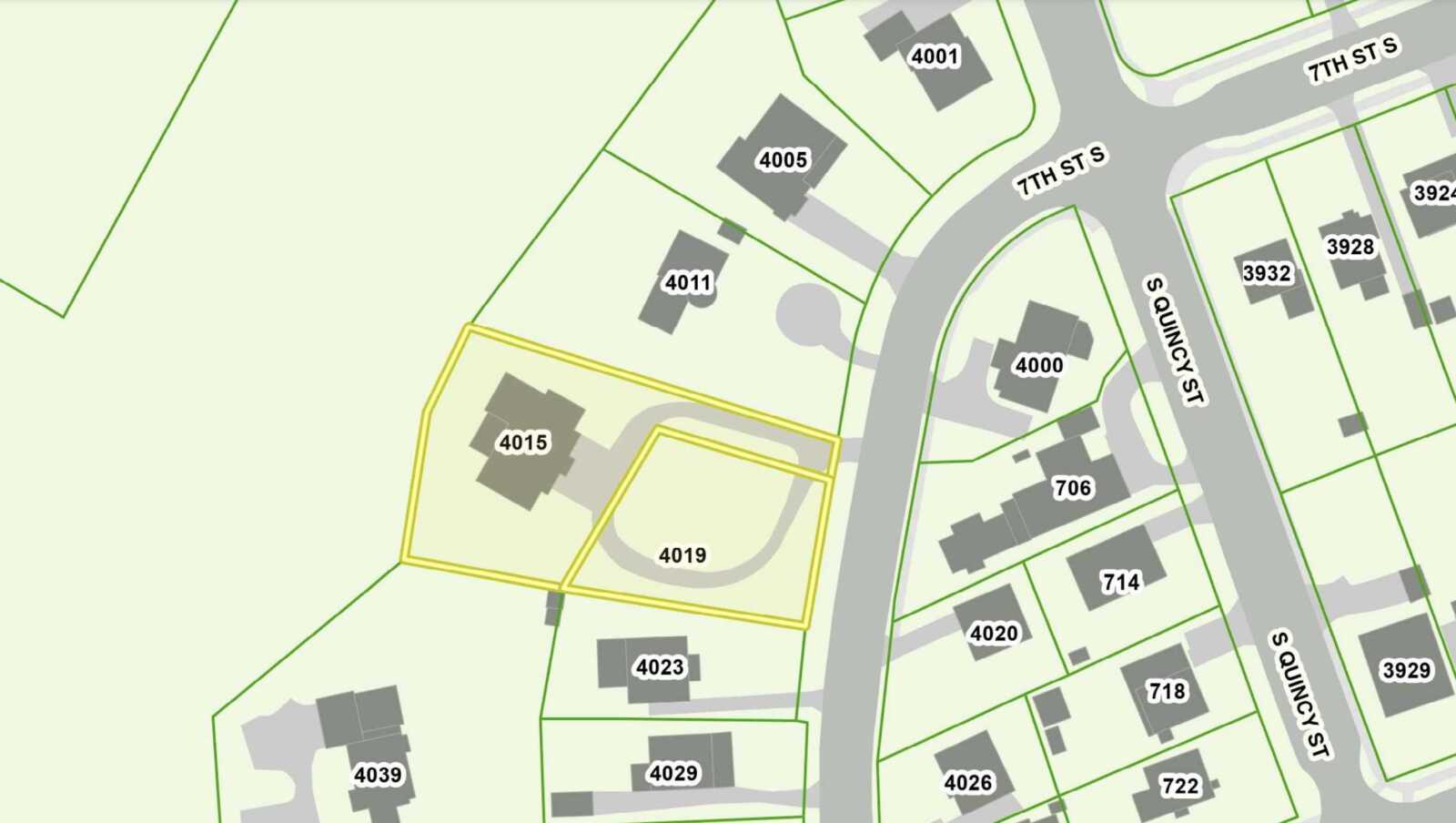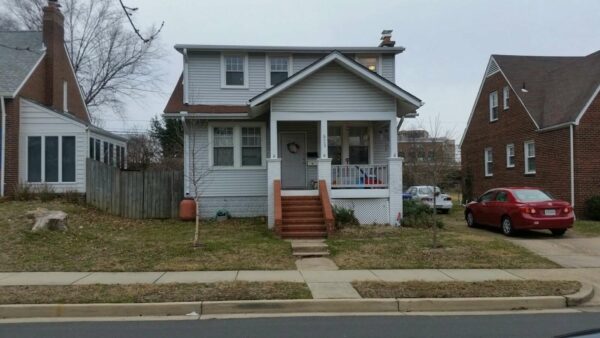Arlington’s Board of Zoning Appeals has rejected a neighbor’s attempt to stop two proposed Expanded Housing Option developments in the Alcova Heights neighborhood.
An affiliate of local homebuilder Classic Cottages proposes building two side-by-side six-plexes at 4015 and 4019 7th Street S., bordering Alcova Heights Park and a couple of blocks north of Columbia Pike.
A neighbor fought back, filing an appeal with the BZA, which takes up appeals to any decisions or determinations made by the county’s Zoning Administrator.
Normally, residents go to the BZA to appeal decisions related to plans to build additions or add front porches; this appears to be one of the first appeals related to new Missing Middle developments.
In February 2023, before the Missing Middle ordinances were approved, Classic Cottages submitted a request to re-subdivide two properties in a “pipestem” configuration, where the boundaries of one property form a “pipe” around the other. After the Missing Middle or Expanded Housing Option (EHO) ordinances went into effect in July, Classic Cottages submitted permits to replace the current single-family home and circular driveway spread across the two lots with a pair of 6-plexes.
“Pipestem” lots are a rarity now because many years ago, they were so hated by the community that the Zoning Ordinance Review Committee got the county zoning ordinance amended to make pipe-stem developments more difficult, says Barnes Lawson, the attorney for Classic Cottages.
“The reason is that you had problems with driveways. You had houses behind houses. It was just not the ideal way in which to provide housing for our community,” he said.

In her appeal, neighbor Kelley Reed argued that the permits were illegally issued. She contends the lots, created via subdivision, did not yet exist in county land records when the permits were issued. Also, she said, they do not conform with the 60-feet minimum width required for EHO developments and the EHOs would have to be put on portions of the lot that cannot be built on.
“This is not a pro- or anti-EHO case,” said Reed. “This case has ramifications far beyond EHO and regardless of use, as this case is about getting the math right. It’s about following the rules. It’s about not cherry-picking definitions. Please correct the staffs’ errors and reject the wrongly approved permits.”
Several neighbors joined the chorus, dwelling less on the math and more on how the project does not fit with the surrounding houses and would hurt the neighborhood.
Jamshid Kooros, who identified himself as a Missing Middle supporter, argued that building multifamily buildings on narrow, deep lots would make this project “the poster child of those who oppose the changes.” That has already come to pass, however, as the project figured into a recent presentation by Arlingtonians for Our Sustainable Future, a local group that has argued against the policy changes.
Others, including the president of Classic Cottages, came to its defense, arguing that residents are hijacking the purpose of BZA appeals to relitigate Missing Middle.
“In all the years we’ve been doing this — building houses all over the county — it never occurred to me that adjacent property owners could file BZA cases against one of our projects. It’s never happened before,” David Tracy, the president of Classic Cottages said. “This particular case seems to be more about the EHO policy itself and I would respectfully ask that, to the extent that it is the policy that’s being challenged, that there’s a proper venue — a larger court case that’s being handled right now.”
Thomas Peters and his wife Natalie found the perfect home in Arlington — one that already had an elevator that Thomas would need to get around in his wheelchair.
It did have one downside, however. The trees on his neighbor’s property, which is at a higher elevation, block natural light from reaching his backyard.
That poses a problem for Peters, whose spinal cord injury — sustained while swimming 10 years ago — left him paralyzed and made it harder for his body to regulate his temperature and stay healthy. The need for accessible sunlight became obvious during the pandemic when he was stuck in his apartment.
“UV light is the best disinfectant and it is hard to get in the wintertime,” he said. “I knew I wanted a place where I could live in the sunlight.”
So Peters commissioned an architect to draft plans for a sunroom. Before those could be realized, however, he learned he would have to get special permission to build it because the home already exceeds the allowable size for a main building on a 10,000-square-foot lot, according to the zoning code.
The last 15 months became a winding legal process that frustrated Peters at times.
“My journey of living with a disability has been one of losing lots of agency,” he said. “I’m a very go-getter type of guy. One of the most frustrating things about living with a handicap is that there are things you just can’t overcome. It’s especially frustrating when you can’t overcome things in your own home after pursuing the dream of independent living.”
Last Wednesday, however, his vision for the property eventually prevailed. He he got the go-ahead for the sunroom when the Board of Zoning Appeals (BZA) unanimously greenlit a variance for the site. The citizen commission considered not just local zoning ordinances but also the Americans with Disabilities Act and ultimately acted against a recommendation by county staff to deny his request.
ARLnow reached out to some of the five BZA members but did not hear back before deadline.
Barnes Lawson, the lawyer for Peters, said last week’s decision was a rare one that resolved a cordial disagreement with the county over what constitutes a reasonable accommodation for a disability.
“Zoning Division staff does not believe that the applicants have proven an explicit connection between the requested size of the proposed improvements and their ability to remedy a hardship, as they have not shown that the benefits provided by the proposed conservatory could not also be provided elsewhere in the dwelling,” according to a county report.
In a county report, staff emphasized that the Peters home already exceeds the maximum lot coverage allowable for a main building on a lot of its size. The county offered Peters two paths forward that would not require a variance.
He could build a front porch of at least 60 square feet and earn the right to extend the footprint of his house by 3%. The zoning code encourages the construction of front porches — and, as another example, discourages garages near the front of the house — as a way to promote neighborly interactions.

(Updated at 6:15 p.m.) Seven years ago, Les Garrison bought a two-family home in the Aurora Highlands neighborhood so that his son’s family could live in one half and the other could be rented out.
He had always intended to renovate the home near Crystal City, which consists of two apartments, each with two bedrooms and one bathroom. He also wants to modernize it, making it accessible to people with disabilities and adding solar panels.
Garrison tells ARLnow he wants to provide an affordable housing option to his son, a county employee, and people like his other tenants — two women over 60, a barista and a graduate student.
“My son… he can’t afford to live in this neighborhood, unless we have revenue coming in from the house,” Garrison said. “That’s what this is about: allowing him to stay in Arlington.”
He expected to get approvals in 2017 and start construction in 2018. Instead, his plan to enlarge and modernize the house will require approvals from the Planning Commission and the County Board as part of a more complex county permitting track that even features a county webpage devoted to the project.
The Garrison’s Site Plan Review process, which involves more scrutiny and more revisions to attain the green light to start construction than an administrative approval typical for single-family homes in Arlington, has also put him out nearly $100,000 in permitting fees, and payments to lawyers, architects and arborists.
Although dates have not yet been set for County Board approval, the Garrison residence would be the second duplex project to go before the board this year. Members approved construction at a Ballston duplex at 1201 N. Vernon Street in May. Meanwhile, from January through June, the county has administratively approved construction of 66 single-family detached homes and construction started on 27 similarly-approved townhouses.
This disparity has drawn criticism from some members of the Planning Commission, who are the last to provide input before sending a project to the County Board for a virtual rubber stamp, as well as housing advocates, who say this reflects a “broken” zoning code.
County staff, meanwhile, say that changes Garrison is proposing require community input. But, they said relief for duplex homeowners in similar situations could come in the future, if zoning standards are changed for lower-density multifamily housing types as part of the in-progress Missing Middle Housing Study.
That might put homeowner renovations of duplexes that don’t confirm to current zoning on the same regulatory playing field as the tear-downs that have become commonplace across the county.
“Right now, a builder can put up a 3,000 square foot house and sell it. It’s pretty much that simple — no public meetings, no expensive lawyers, no neighborhoods weighing in on, I don’t know, whether your driveway pavers should be beige or gray,” said Daniel Weir, who is the vice-chair of the Planning Commission. “Split that exact same building in half — same amount of driveway, same amount of parking, same lot lines — try and build literally almost the exact same building, and all of a sudden everyone in the county gets to have a say.”
County Board members enthusiastically and unanimously passed six amendments to the Arlington County Zoning Ordinance intended to open up more elder care housing in Arlington.
Developers can now build elder care facilities across 18 zoning districts, after being limited to a handful of possible location for such facilities before.
The Board also voted to update parking standards and to update definitions for terms such as nursing homes, assisted living facilities, independent living facilities, and continuing care retirement in county code, allowing more types of elder care facilities to be built.
Parking regulations for assisted living spaces and independent living facilities are now set to 0.5 spaces per bedroom, while the minimum parking requirement for nursing homes is now 0.5 spaces per bed.
“It really is good, it’s a need — there are more and more of us in this demographic every day and we need to be thinking about it,” said County Board Vice Chair Libby Garvey.
There are more than 35,000 Arlington residents above the age of 60, according to a county staff report.
“This represents 14% of the County’s population, and this percentage is expected to grow in the coming decades,” the report notes. “Across the nation, one in five Americans will be age 65 or older by 2030.”
The zoning changes were bolstered by the results of year-long study by the Arlington County Zoning Committee. Hundreds of Arlington residents answered surveys and participated in public forums and meetings. During an October community forum, participants were asked to place stickers on a map indicating where they would like to see future elder care housing.
“The study provided a community-wide forum for discussing a host of issues about housing for our older residents,” said principal planner Nick Rodgers. “It’s something that touches all of us — everyone has, or will have, an older loved one who will likely need this kind of extra help at one time or another.”
The zoning changes notably allow a proposed six-story senior living center along the 4300 block of Lee Highway to move forward. McLean-based developer Artis Senior Living filed plans with the county in March to build a 175-unit property, but per zoning laws, was not permitted to construct in the area.
“I think this is an excellent body of work,” said board chair Katie Cristol. “And it will serve one definitive plan, and I hope with many more to come.”
There are currently 12 elderly residential care facilities in Arlington, all built before 2013 — when the county tightened zoning regulations, effectively limiting elder care facilities to a handful of smaller spaces meant for hospitals. The most recent facility is Mary Marshall Assisted Living, which opened in the Penrose neighborhood in 2011 and is funded by the county.
Photo (1) via sunriseseniorliving.com
The Arlington County Zoning Committee (ZOCO) is recommending the county open up more areas for potential use as elder care facilities.
During a meeting last night (Tuesday), ZOCO urged the county permit elder care facilities across 18 zoning districts, citing a growing elderly population and prohibitive restrictions on where such facilities can currently be built. The loosened regulations would let developers build nursing homes, assisted living facilities, independent living facilities, and continuing care retirement communities.
“This limitation on potential sites and development standards has become a barrier to licensed residential care facilities seeking to locate in Arlington,” said Nick Rogers, zoning amendment coordinator with the Department of Community Planning, Housing and Development.
Last night, Rogers presented interim results of the county’s study of ways to build more senior housing, particularly in places like Rosslyn, Crystal City, and along Columbia Pike.
“Elder care facilities are an appropriate use for zoning districts which already permit multifamily development,” he said.
There are more than 35,000 Arlington residents above the age of 60, according to a county staff report.
“This represents 14% of the County’s population, and this percentage is expected to grow in the coming decades,” the report notes. “Across the nation, one in five Americans will be age 65 or older by 2030.”
That growing older population will need places to live that support their needs.
“Arlington is really behind in housing for older people and more assisted living facilities are definitely needed,” said Joan McDermott, a former member of the Arlington Commission on Aging, during an October 7 community forum.
There are currently 12 elderly residential care facilities in Arlington, all built before 2013 — when the county tightened zoning regulations, effectively limiting elder care facilities to a handful of smaller spaces meant for hospitals. The most recent facility is Mary Marshall Assisted Living, which opened in the Penrose neighborhood in 2011 and is funded by the county.
Developer Artis Senior Living submitted a site plan earlier this year to build a six-story, senior living facility along the 4300 block of Lee Highway. The plans stalled after the site turned out to be outside the county’s few areas designated in 2013 for elder care facilities, leading the developer request an exemption to move forward with the project.
A representative from the McLean-based company was present during the October community meeting on the issue but declined to comment.
During the community forum, residents were asked to place stickers on a map indicating where they would like to see future elder care housing. The blue dots were dispersed across the the county, with the biggest clusters of dots stuck to the Courthouse and Bluemont areas.
The zoning expansion is scheduled for review with the county’s Planning Commission in December, before reaching the dais of the Arlington County Board later that month.
Photo (1) via sunriseseniorliving.com
Arlington officials could soon advance zoning changes designed to make it easier for more childcare providers to open up shop in the county, as part of a lengthy push to increase access to daycare options for local parents.
County leaders have batted around a variety of potential changes for months now, but they finally seem ready to pass a suite of zoning tweaks impacting both large childcare centers and smaller “family daycare” homes. The proposals will go before the Planning Commission’s Zoning Committee for the first time tonight (Wednesday), and could make their way to the County Board sometime later this spring.
The Board previously approved a “Childcare Action Plan” last summer laying out some potential changes, including a new subsidy to help families afford daycare services. But it has long planned these additional zoning changes to encourage more childcare providers to move to Arlington, initially hoping to vote on them before the end of 2018 and address what officials see as the exorbitant cost of childcare in the county.
Despite the delay, officials now seem ready to advance the proposals, particularly after soliciting feedback from the community via online surveys and public gatherings in recent months. In all, the main potential zoning changes include:
- Cutting back on parking requirements for new daycare facilities
- Expanding the maximum number of children allowed in family daycare homes from nine to 12
- Allowing small family daycare homes to educate nine children “by right,” without extensive county approval
- Reducing the frequency of county permit reviews for daycare facilities
The parking changes may well prove to be the most impactful alterations that the county is considering, as many childcare providers say Arlington’s current standards make it a bit difficult for them to open new locations along the county’s Metro corridors.
Currently, the county requires that large childcare centers offer one parking space for each employee.
But staff subsequently discovered that many childcare employees aren’t driving to work — a December study by the county found that roughly 40 percent of parking spaces for childcare centers currently go unused, and a survey of local employees found that 36 percent commuted by using public transit, biking, carpooling or walking.
Accordingly, county staff are proposing requiring one parking space for every eight children attending a center, which should cut back on the number of parking spaces each one needs. The average daycare center in the county currently requires about 40 spaces using the employee-based ratio; the new proposal would cut that number back to about 25 spaces per location.
That would put Arlington more on par with parking requirements in Fairfax and Prince William counties, where daycares generally have 32 spaces and 24 spaces, respectively.
Staff are also suggesting that the Board allow additional parking reductions for centers hoping to locate near Metro and bus stations, letting companies apply for less parking as part of the process of earning a use permit from the county. For comparison, Alexandria lets childcare centers have as few as three spaces if they have access to transit options, while D.C. only requires five spaces for all centers.
The transit advocates over at Greater Greater Washington are especially enthusiastic about that section of the plan. The group’s development director, Pentagon City resident Jane Fiegen Green, praised the county for examining parking requirements in a recent blog post, and urged readers of the site to back changes to such “outdated” standards.
While the parking changes would largely impact centers educating dozens of children, many of the other proposed changes are aimed at loosening standards for smaller family daycare homes.
By bumping up the maximum number of children allowed in each facility to 12, the county would come into alignment with the standard outlined in state law. Arlington and Alexandria are currently the only localities in the D.C. area with a cap of nine children, staff wrote in a report for the zoning committee.
“Expanding the maximum number of children will increase Arlington’s potential child care supply, align with the maximum set by the state, provide potential additional revenue for providers and additional child care jobs in homes that are able to increase their capacity, increase opportunities for children to play together and help address the county’s lengthy child care wait lists,” staff wrote.
The recommendations also call for easing permitting requirements on small providers, as many are “intimidated” by the complex process of earning the county’s permission to set up childcare facilities. Staff found that centers with nine children or fewer regularly operate “without significant disruption to their surrounding neighborhoods,” so it would make sense to allow them to open up “by right” without extensive permits.
The proposed changes also include allowing small daycare homes with up to nine children in more dense sections of the county zoned for apartments, which could “expand the number of units eligible to operate a family day care home by approximately 3,220 units in Arlington County.”
So long as the zoning committee signs off on these zoning alterations, the County Board could order public hearings on the matter at its Feb. 23 meeting. The Planning Commission could then take them up on March 4, setting up a final Board vote on March 19.
File photo
 (Updated at 6:05 p.m.) Arlington County Zoning Administrator Melinda Artman is resigning her post to enter a seminary.
(Updated at 6:05 p.m.) Arlington County Zoning Administrator Melinda Artman is resigning her post to enter a seminary.
In a statement, released after ARLnow.com first reported the resignation, Arlington County Department of Community Planning, Housing and Development Director Robert Brosnan called Artman “a dedicated and talented public servant.”
“She brought a high level of professionalism and a strong sense of fairness to her work,” Brosnan said. “She arrived in Arlington at a time when the Zoning Office was beginning a transformation into a higher performing organization and she has helped shape the office and the work of the staff in a very positive way. We thank her for her service to Arlington County, and wish her the very best as she embarks on this new challenge.”
Artman plans to leave her position in August to join the Virginia Theological Seminary, where she will pursue her dreams of becoming an Episcopal minister.
Artman became Arlington’s zoning administrator in 2008, after 11 years with the Loudoun County government. She has 37 years of public service experience, including 25 in Northern Virginia. Her tenure in Arlington has been marked by a string of controversies tied to her by-the-books enforcement of the county’s stringent zoning code.
“By many accounts, Artman hasn’t been a favorite person among property and business owners,” TBD.com noted last year, in an article about Artman’s desire to help with the comprehensive rewrite of the county’s zoning ordinance.
Brosnan says he will name an acting Zoning Administrator “soon.”
 Over the past several months, business owner have complained loudly about the county’s confusing and inconsistent zoning code. From stringent sign enforcement to outdoor seating debates to extended delays in getting permits, business owners — particularly new business owners — have expressed frustration with the level of expense and effort required to avoid running afoul of county regulators.
Over the past several months, business owner have complained loudly about the county’s confusing and inconsistent zoning code. From stringent sign enforcement to outdoor seating debates to extended delays in getting permits, business owners — particularly new business owners — have expressed frustration with the level of expense and effort required to avoid running afoul of county regulators.
But that may be changing.
Tomorrow night, the county’s zoning committee will meet to plan a comprehensive rewrite of the zoning ordinance. The meeting, which will run from 7:00 to 9:00 p.m. in Room A of 2100 Clarendon Boulevard, is open to the public, although the discussion will be confined to the committee.
In a draft proposal, county staff noted that the zoning ordinance was last rewritten in 1950. Because the ordinance has been amended many times on a piecemeal basis, it “contains many inconsistencies” and “includes many sections and regulations that are difficult to understand.”
“There are many administrative practices that are not codified within the Ordinance,” staff also concluded.
See the staff report here.
Neighbor will be pitted against neighbor at the Arlington Zoning Committee (“ZOCO”) hearing tomorrow night. The issue: parking recreational vehicles in the county.
Currently, the county’s RV parking policy is too stringent for some, who want to be able to legally park large RVs in their driveway, and doesn’t go far enough for others, who see RVs as an ugly, property-value-reducing blight on Arlington’s residential communities.
The two opposing arguments are laid out in excruciating detail in this county document.
The ZOCO hearing is scheduled from 7:00 to 9:00 p.m. tomorrow (Tuesday) night at the Navy League Building (2300 Wilson Blvd).


